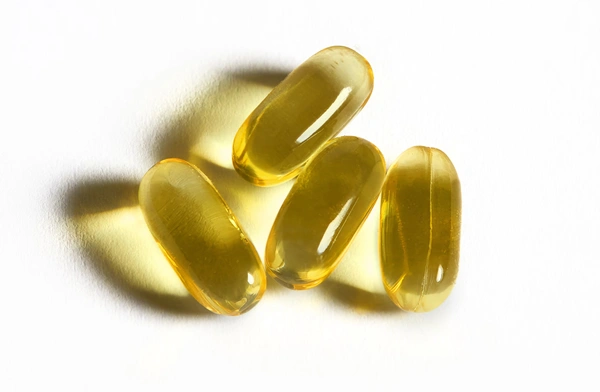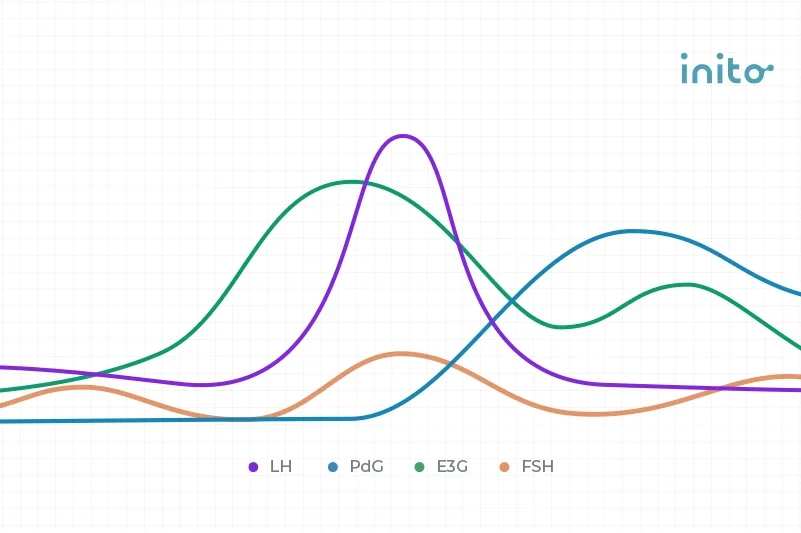Content table
Takeaways
- Perimenopause is a gradual period of changes that women experience prior to menopause.
- Common perimenopause symptoms include: 1) irregular 2) menstrual cycles, 3) mood swings, 4) hot flashes, and 5) trouble sleeping.
- Vitamins can help provide relief for some of these perimenopause symptoms. They can also boost your overall health when your body is in a state that’s more vulnerable to disease.
- Key vitamins to take during perimenopause include: vitamin D, vitamin E, calcium, magnesium, and omega-3 fatty acids.
- Vitamin D, calcium, and magnesium all support your bone health.
- Magnesium also helps your cardiovascular function, mood, and sleep.
- Vitamin E can provide relief for menopause symptoms like vaginal dryness and inflammation. It may also help reduce hot flashes.
- Omega-3 fatty acids help regulate your cholesterol and reduce inflammation. They can also boost your cognition and regulate mood swings.
- Besides taking vitamins to cope with menopause symptoms, you have other options too. You can make changes to your lifestyle (like adjusting your sleep routine). You can also undergo hormone therapy and treat any underlying health conditions.
What is perimenopause and menopause?
Over 60% of women report not being informed about what menopause is so here’s a quick rundown.
Menopause marks the end of your reproductive years. It is a completely normal part of the aging process and officially begins once you haven’t had a menstrual period for a year.
It’s not a shift that happens all of a sudden though. And that’s where the term perimenopause comes in.
“Peri” is a Greek root word meaning “around.” So perimenopause refers to the period of time (about 7 years on average) when you are nearing menopause.
For most women, this transition begins between ages 45 and 55. You’ll start to notice more irregular menstrual cycles and hormonal changes. This can lead to frustrating symptoms like vaginal dryness, moodiness, and sleep disruptions.
The intensity and duration of perimenopause symptoms vary from woman to woman though.
To deal with some of these common symptoms, many women take vitamins. Learn more about why in the next section!
- Hot flashes. Research estimates that between 30 and 70% of perimenopausal women have hot flashes. These are intense waves of body heat that are very uncomfortable and that can also lead to night sweats.
- Sleep disturbances. Women who experience more intense hot flashes are more likely to also have insomnia.
- Vaginal changes. You may have more vaginal dryness. Some also experience pain or general irritation while peeing or having sex. And these vaginal changes can lead to a higher chance of having UTIs or vaginal infections.
- Mood swings. Mood changes and irritability, along with anxiety and depression, are common during perimenopause.
- Irregular periods. You’ll begin to have longer or shorter menstrual cycles and changes in the length and flow of menstruation.
- Other symptoms. Hormonal changes can also cause weight gain, breast pain, muscle aches, and headaches.
Key vitamins to take during perimenopause
In the table below, you’ll see the dietary supplements that can support you the most during perimenopause.
All of these can be found naturally in certain foods that you may consume. But you may not be able to get the daily recommended amount from food alone. In that case, taking a supplement may be beneficial for you.
(Before making any changes to your diet or taking a new supplement, be sure to consult your doctor).
Vitamin | Recommended dosing | Found naturally in |
Vitamin D | Oily fish, eggs, cheese, yogurt, fortified milk, orange juice, shitake mushrooms | |
Calcium | Milk, yogurt, cheese, salmon, tofu, leafy greens, fortified foods, beans | |
Magnesium | Dark chocolate, avocado, nuts, legumes, fatty fish, whole grains | |
Vitamin E | Green leafy vegetables, whole grains, fortified cereals, vegetable oils | |
Omega-3 fatty acids | Fish, nuts and seeds, vegetable oils |
Want to know a bit more about how each of these supplements can support you during perimenopause? Take a closer look at each one below!
Vitamin D
A major health concern for perimenopausal and menopausal women is osteoporosis. This is when your bones become progressively weak and brittle (i.e., more prone to fractures).
Osteoporosis affects over 200 million women all around the globe. But one of the major instigators of the disease is declining levels of estrogen. (And it just so happens that this decline begins during perimenopause.)
This is because reduced estrogen decreases your bones’ ability to regenerate new tissue. At the same time, it also increases how quickly your bones break down.
Another precursor to osteoporosis is vitamin D deficiency. As you age, your body breaks down vitamin D more rapidly. This can be problematic because Vitamin D helps your body absorb calcium. And low calcium can negatively impact your bone strength.
How vitamin D supplements support you during perimenopause:
Mainly, it supports healthy bone mineral density.
Recommended daily amount: 600 IU/day
Calcium
Like vitamin D, calcium plays a crucial role in your bone health.
But a doctor will typically only recommend calcium supplementation for women who have low calcium levels. Once you transition beyond menopause though, it’s not recommended. This is because it may pose a risk to your cardiovascular function.
In fact one clinical trial discovered that routine calcium supplementation after menopause led to increased blood cholesterol levels and a greater risk of heart disease.
All that said, if you have low calcium levels, it’s worth considering supplementing during perimenopause.
How calcium supports you during perimenopause:
The most important role calcium plays is maintaining your bone health!
Recommended daily amount: 1000-1200 mg/day
Magnesium
Studies have shown magnesium to be supportive during perimenopause in a variety of ways.
For one, having a magnesium deficiency is correlated with osteoporosis. This is because it supports your body by strengthening your bones.
Magnesium also has the potential to improve your sleep and avoid bouts of insomnia. This is because of its ability to encourage melatonin secretion. (Melatonin is a hormone that regulates your sleep-wake cycles.)
On top of that, magnesium helps with balancing certain mood-impacting chemicals in your brain.
Magnesium supports you during perimenopause by:
- Supporting your bone health and heart health
- Regulating mood swings and lowering your risk of depressive symptoms
- Helping you get better sleep
Recommended daily amount: 320 mg/day
Vitamin E
Vitamin E supports you during perimenopause by:
- Providing relief for menopausal symptoms of atrophic vaginitis like dryness and irritation. (It does this through its ability to repair cells that affect your skin health.)
- Potentially reducing episodes of hot flashes and night sweats. (Researchers still need to determine the extent of its connection to hot flashes).
Recommended daily amount: 15 mg/day
Omega-3 fatty acids
Two health challenges that perimenopausal women face are high cholesterol and depressive symptoms.
One study of postmenopausal women revealed that low omega-3 fatty acid intake was associated with an increased risk of depression.
Other studies show a similar connection between mental health and omega-3 fatty acids. A systemic review found that taking omega-3 fish oil supplements improved mood and cognitive function.
Omega-3 fatty acids support you during perimenopause by:
- Acting as an anti-inflammatory within the body
- Promoting lipid balance to better regulate cholesterol levels
- Supporting brain health and mood
Recommended daily amount: 1.1 g/day
Beyond supplements, what else can you do to manage all those perimenopausal symptoms?
Next, you’ll learn a few more ways you can take back more of your control during this transitional period!
Other ways to cope with perimenopausal symptoms
1. Supportive lifestyle changes
As mentioned, eating a well-balanced diet can be a game-changer during perimenopause. One aspect of your diet you may want to adjust is increasing how much estrogen you get naturally. Know more: How to Increase Estrogen Naturally: 3 Simple Ways Other helpful lifestyle changes to consider include:- Reduce your stress levels. Try meditating, journaling, deep breathing, and mindfulness practices like yoga
- Get adequate quality sleep. Sleeping on a regular schedule has been proven to improve estrogen balance by up to 60%. You can also improve your sleep quality by limiting screen usage and caffeine intake prior to sleep.
- Exercise regularly. Exercising has many benefits for your overall health. But it can also support you with reducing stress and promoting better sleep.
- Avoid certain substances. Quit the use of substances that can mess with your hormones and overall health (like cigarette smoking).
2. Hormone replacement therapy
Worried that these lifestyle measures aren’t enough to make a dent in your menopausal symptoms? There are additional measures you can take! One of these options is hormone therapy. The aim of hormone therapy for perimenopause is to balance out your hormones, especially boosting estrogen. Hormone therapy for perimenopause can be in the form of a pill. These contain a combination of estrogen and progesterone. Or you could also take vaginal estrogen which comes in a variety of forms (creams, gels, and tablets). Once you strike a better balance of hormone ratios, you’re likely to begin seeing some of your menopausal symptoms improve!3. Management of other health conditions
Other underlying health conditions could intensify your experience of perimenopausal symptoms. So be sure to talk to your doctor about ways you can manage any conditions you have. This is especially important if you have anxiety, depression, type 2 diabetes, or high cholesterol. They may prescribe you medication or suggest additional treatments.
FAQs
Being intentional about the foods you eat can help you get key vitamins to support your mind and body during perimenopause. Vitamins like magnesium, vitamins D and E, calcium, and omega-3 fatty acids can be found naturally in many foods.
Sticking to a consistent sleep schedule, reducing stress, and exercising regularly can also help.
Vitamin D, calcium, and magnesium can help you maintain bone strength during perimenopause.
For improved sleep quality and mood, consider taking magnesium. If you’re experiencing vaginal dryness or discomfort, vitamin E can be helpful.
And you can take omega-3 fatty acids to manage cholesterol levels, inflammation, mood, and cognition.












